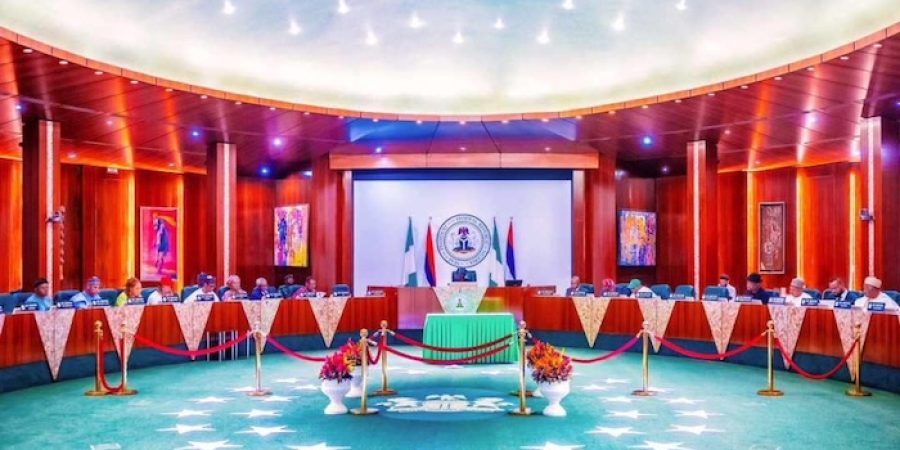The Federal Executive Council (FEC) on Thursday approved N712 billion for the full rehabilitation, upgrade, and modernisation of International Terminal One at the Murtala Muhammed International Airport, Lagos.
The approval was the centrepiece of a sweeping N900 billion aviation infrastructure plan for the country.
Minister of Aviation and Aerospace Development, Festus Keyamo, made the disclosure while addressing newsmen after the FEC meeting presided by President Bola Ahmed Tinubu at State House, Abuja.
Keyamo said the project, awarded to China Civil Engineering Construction Corporation (CCECC), will strip the old terminal down to its structural core before rebuilding it with new mechanical, electrical, and plumbing systems.
The project, funded entirely through the Renewed Hope Infrastructure Development Fund, will be executed over a period of 22 months.
According to Keyamo, “We have decided to strip it down to only the carcass and then do the complete M&E again.”
He emphasised the administration’s departure from patchwork repairs towards comprehensive overhaul of key aviation facilities.
FEC also approved the expansion of Terminal Two, including the construction of a new apron, access roads, bridges, and related works.
When combined with the Terminal One project, the total cost of all Lagos-related airport works amounted to N712.26 billion, making it one of the most significant single investments in Nigeria’s aviation sector in recent years.
In a move to improve security at the Lagos airport, the council approved a N49.9 billion perimeter fencing project.
The 14.6-kilometre metal fence will feature an intrusion detection system, CCTV cameras, solar-powered floodlights, and a patrol road.
According to the minister, the security enhancements will include a modern command centre capable of detecting any movement near the fence in real-time.
“Anyone or anything close to the fence will be detected immediately, and the location pinpointed,” he said.
Keyamo said, “The council also approved greenlit upgrades at other key airports across the country.
“At Malam Aminu Kano International Airport in Kano, FEC approved N46.39 billion for the rehabilitation of both runways and taxiways, along with an upgrade of the airfield lighting to Category Two (CAT 2) standards.
“The 24-week project is expected to significantly improve operational safety and reduce weather-related flight disruptions.”
He said, “Port Harcourt International Airport is also set for a runway and taxiway rehabilitation, with airfield lighting upgrades to CAT 2 standards approved at a cost of ₦42.14 billion.
“In Lagos airport, airfield lighting on Runways 18 Left and 36 Right, as well as on Taxiways B and C, will be upgraded to CAT 2 LED systems under a N44.13 billion contract with a 30-week completion period.
“To further improve operations at Lagos’ domestic wing, the council approved the reconstruction and conversion of over 82,000 square meters of apron areas.
“This project, valued at N24.27 billion, will be carried out in phases over approximately 17 and a half months to expand aircraft parking space and ease traffic management.”
Keyamo said, “In a major shift toward private sector involvement in airport management, FEC also approved the full business case for the 30-year concession of Akanu Ibiam International Airport in Enugu.
“The concession includes the completion and operation of the airport’s cargo terminal by a private consortium.”
The minister said the decision was driven by the financial strain on government resources from running smaller airports.
He stated, “Most of the smaller airports, apart from the major ones, are running at a loss. The profits we make from Kano, Lagos, and Abuja often go into keeping these others alive.”
He said the concession model would unlock the commercial potential of non-aeronautical revenue streams, such as conference centres and shopping malls, which generate substantial income at modern airports globally.
“That has always been the plan of this administration—to concession some airports to private individuals and entities so they can run them profitably,” Keyamo said.
To reassure stakeholders, he stressed that the process had been transparent and inclusive, particularly with regard to labour unions.
“I am not someone who ignores the unions. From the very start, I directed that they must be part of the committee,” he said, stressing that labour representatives have been fully involved in the concession process.
The minister pledged that full details of the concession, including the identities of the consortium members and financial terms, would be made public in due course.
He said, “At the right time, we will jointly address Nigerians and disclose all necessary details to ensure full transparency.”
FEC also approved two major electrification projects with a combined value of N213.7 billion to improve energy access in universities, teaching hospitals, and rural communities across Nigeria.
Minister of Power, Chief Adebayo Adelabu, announced the approvals while briefing reporters.
Adelabu said the first project, valued at N145 billion, inclusive of 7.5 percent VAT, was for the engineering, procurement, and construction (EPC) of power systems under the Energising Education Programme (EEP), implemented by the Rural Electrification Agency (REA).
It will also be funded through the Renewed Hope Infrastructure Development Fund and is expected to be delivered within seven to nine months.
EEP is targeted at easing the energy burden on Nigeria’s public universities and tertiary teaching hospitals by providing reliable, renewable power supply.
Adelabu stated that many institutions had faced severe electricity challenges, leading to blackouts and industrial actions, as they struggled to meet exorbitant utility bills from distribution companies.
He said, “The absence of reliable power in most institutions has grown into a crisis. This initiative will bring relief to educational and medical institutions and improve the quality of education and healthcare delivery.”
He listed eight institutions set to benefit from the current phase of the programme to include University of Lagos; Ahmadu Bello University, Zaria; Obafemi Awolowo University, Ile-Ife; University of Nigeria, Nsukka; University of Ibadan; University College Hospital, Ibadan; Federal University, Dutse, Jigawa State; and Federal University, Wukari, Taraba State.
Adelabu added that the new projects built on earlier interventions executed with World Bank support, had already delivered solar power installations to several universities, including the University of Abuja (3 megawatts), University of Maiduguri (12MW), University of Calabar (8MW), Nigerian Defence Academy (2.6MW), and Federal University of Agriculture, Abeokuta (5MW).
“These institutions are now operating without disruption to electricity supply. The new funding is intended to accelerate deployment to more campuses,” he said.
The second project, valued at N68.7 billion, including VAT, is for the procurement and deployment of renewable energy infrastructure under the REA’s Agricultural Centres of Excellence initiative, the minister said.
The programme aims to bring solar-powered electricity to rural communities and agribusiness clusters where grid access is unavailable. It is expected to be completedwithin three months.
According to Adelabu, the rural electrification project is designed not only to provide lighting for homes but also to power agro-processing activities and other productive uses to boost rural livelihoods.
He stated, “This project is meant to empower our rural dwellers by enabling them to engage in productive activities using solar-powered equipment. It’s a key part of our resolve to ensure that no Nigerian is left behind in the transformation of the power sector.
“The total cost approved for this project was N68.7 billion, inclusive of 7.5% VAT, with three months’ completion or delivery periods.
“For the Nigerian education, the total project amounts approved was N145 billion, inclusive of 7.5% VAT.”
He emphasised that the deployment of off-grid renewable energy solutions aligned with the Tinubu administration’s broader agenda to promote inclusive growth and economic diversification through sustainable infrastructure development.
“The approvals granted today demonstrate President Tinubu’s commitment to transformative investments in power infrastructure that directly impact lives, learning, healthcare, and productivity,” Adelabu said.
The federal government also approved billions of Naira for the rehabilitation and reconstruction of several highways spread across the country.
It also commenced reconstruction of the collapsed Keffi Flyover in Nasarawa State, where a tragic incident earlier in July claimed three lives. Minister of Works, Senator Dave Umahi, who disclosed this on Thursday while briefing newsmen, described the collapse as “very unfortunate”.
Umahi confirmed that the government had reached a settlement with the bereaved families.
“We lost three lives there. We have settled with the families, who are not pressing charges. Reconstruction has started,” Umahi said.
He stated that one carriageway of the flyover had been closed to allow urgent repair works.
The minister added that structural investigations prompted the closure to prevent further incidents.
The Keffi Flyover, a major link between the Federal Capital Territory (FCT) and several North-central states, collapsed on July 4, raising widespread concern over infrastructure safety.
Umahi assured that the Tinubu administration was prioritising accountability and public safety, and urged citizens to support ongoing inspection and monitoring efforts.
He said the intervention alignws with the administration’s broader commitment to ensuring the integrity of road and bridge assets nationwide.
FEC likewise approved major reviews and funding for critical road and bridge projects across the country as part of Tinubu’s infrastructure transformation agenda.
Umahi revealed that 360 road rehabilitation projects were completed in 2023, and inspections were underway across all geopolitical zones.
He disclosed that state engineering chambers will now participate in the tracking of federal projects to promote transparency and collaboration.
Umahi listed several high-value projects, many exceeding N10 billion, that had either commenced or received substantial disbursements, with a detailed list to be published next week.
He named key highlights of ongoing and approved projects, including:
Abuja Road Lots: Lot 1: 118 km at N275 billion (30 per cent disbursed; 30 per cent completed); Lot 2: 164 km at N502 billion (N150 billion disbursed for six sections)
The works minister also named major corridor projects and the funding stages to include Enugu–Onitsha Road: 72 km at N150 billion (N45bn released); Abuja–Kano Road: N220 billion (30 per cent disbursed); Bauchi–Jigawa Road Sections: fully funded; Nembe–Brass Road: N156 billion (30 per cent released);
Port Harcourt–Bodo–Bonny Road: 35 km at N200 billion near completion; Benin–Ifon–Akure: 108.4 km (30 per cent released); Akure–Ado-Ekiti: 256 km at N761 billion (30 per cent released).
Umahi announced new approvals and project variations, including Biu–Numa Road (Borno/Adamawa): Revised to N61.76 billion (from N15.4 billion), Maraba–Keffi Road; (Nasarawa): 43.6 km dualisation at N76 billion; Ikorodu–Sagamu Road (Lagos): Variation of N11.42 billion approved for completion; Kashamu–Amshi–Guru–Gurus Road (Yobe): Revised to N23.4 billion for binder courses and a new vehicle bridge; Sokoto–Badagry Superhighway: Kebbi Section: 258 km x2 at N1.92 trillion and Sokoto Section: 120 km x2 at N912 billion.
Other projects, he said, were Afe Babalola University Access Road (Ekiti): Revised to 14.4 km at N9.32 billion due to funding constraints; Trans-Saharan Highway (Oyo–Benue border): Revised from 180 km to 231.64 km; cost increased to N445.8 billion due to soil failures and realignment; Lagos–Calabar Coastal Highway (Sections 4A & 4B):
Ogun & Ondo States: 80.35 km x2 at N1.65 trillion and includes 6-meter excavation due to swamp terrain.
Umahi emphasised that the projects were not just infrastructure upgrades but strategic economic drivers expected to impact state GDPs, trade, and national cohesion.
He defended the cost-effectiveness of the contracts and affirmed that the rollout of projects had been equitably distributed across zones.
He stated that the administration was open to scrutiny and committed to delivering quality infrastructure across the country.
Another approval by FEC was for the upgrade of the Oncology Centre at the University College Hospital (UCH), Ibadan, another milestone in the Tinubu administration’s aggressive reform of Nigeria’s health sector.
Coordinating Minister of Health and Social Welfare, Professor Muhammad Ali Pate, said the approval was part of a broader agenda to revolutionise cancer care and health infrastructure in the country.
According to him, the revamped UCH Oncology unit will feature advanced equipment, including linear accelerators and diagnostic systems for radiotherapy.
He added that similar comprehensive oncology centres recently launched in Katsina, Enugu, and Jos illustrated the administration’s commitment to building world-class facilities locally.
“Cancer patients now have access to state-of-the-art treatment within Nigeria, unless they choose otherwise,” he said.
“This government, under the leadership of President Tinubu, is making significant investments so that our people no longer have to travel abroad for care that can be accessed here,” Pate added.
The minister stated that additional cancer centres were in the pipeline for Lagos and Zaria, while referencing the ongoing commissioning of over 10 major projects at the newly inaugurated University of Abuja Teaching Hospital, one of the largest in West Africa.
They included neurology, stroke, heart, and interventional radiology centres, among others.
The minister said, “This is unprecedented, Nigeria has never witnessed this level of presidential attention and investment in the health sector.”
Pate also commended the collaborative efforts of the Ministers of Finance and Budget in delivering the president’s health sector renewal vision.
Commenting on the state of industrial harmony in the sector, the minister acknowledged two years of relative peace and appreciated health workers across federal and state institutions for their resilience.
He, however, noted concerns raised by professional groups over a recent circular by the National Salaries, Income and Wages Commission, which had since been withdrawn.
Pate stated, “We’re now in the process of negotiating revised allowances transparently.”
He said active discussions were ongoing with key associations, including the Nigerian Medical Association (NMA) and nurses’ unions.
He assured that some longstanding arrears would be addressed by the Ministry of Finance in due course.
“Not all issues are financial,” Pate added.
He explained, “We are also resolving establishment matters, like the centralisation of nurses’ postings. The government is committed to ensuring that health workers are respected and supported.”
Further negotiations with union leaders are scheduled for Friday, in line with President Tinubu’s directive to maintain constructive engagement for lasting peace, he said.
“The health workers are the lifeblood of the system. Our infrastructure and equipment must go hand in hand with a motivated and supported workforce,” Pate further said.
Deji Elumoye
Follow us on:



